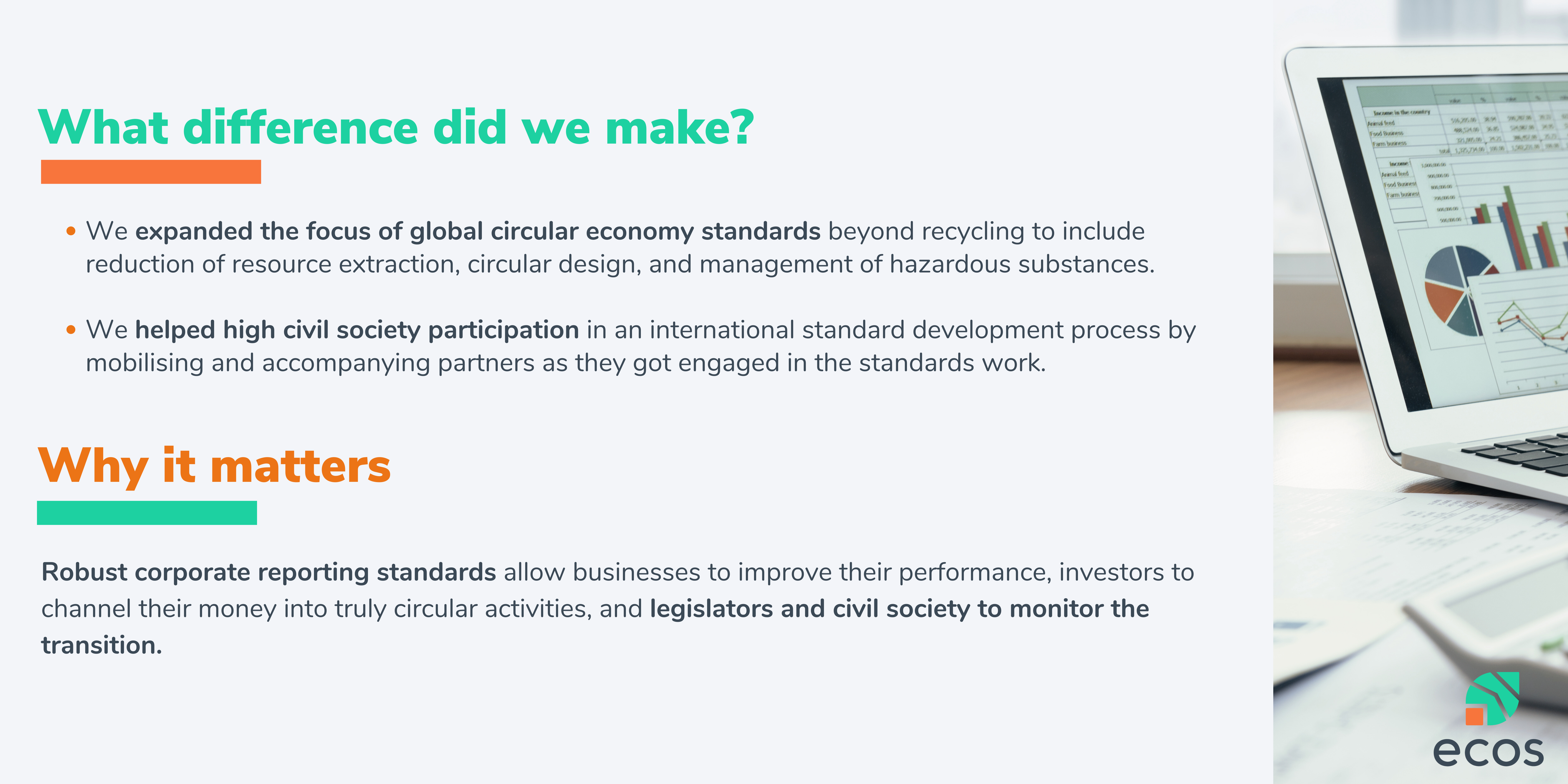Circular economy reporting standards – a key piece of the circular economy puzzle
A regenerative circular economy is key to mitigating the climate crisis, protecting biodiversity, and promoting the well-being of people and the planet. Guiding companies in disclosing their true environmental impacts incentivises strong sustainability performance. Our strategic interventions laid the foundation for a more robust and inclusive circular economy reporting framework worldwide, steering the course towards a real transition to a circular economy.

Robust data can drive positive change
Sustainability reporting standards determine how companies disclose their impacts on the people and the planet. With meaningful reporting, stakeholders – including investors, policymakers, consumers, and civil society – will be able to assess companies’ sustainability performance effectively and make informed business or consumer choices.
But sustainability reporting can only be meaningful when the data is transparent, consistent, and comparable. This is where standards can help by establishing a harmonised framework for companies to follow. Reporting standards can also act as a safeguard against dangerous greenwashing. Robust reporting standards on circular economy for example, will ensure that companies’ reporting goes well beyond managing waste to actually preventing and reducing it.
Ensuring consistency across the board (and borders)
At ECOS, we have long advocated for complete and comprehensive corporate reporting standards – and in 2023 our efforts finally paid off: the need for standardising circularity reporting was recognised worldwide.
The International Standardisation Organisation (ISO) will soon conclude the development of a series of standards on circular economy (or ISO 59000 for those in the know). Advocating for a strong presence of civil society in these processes, we balanced out the systematic dominance of big industry players. We mobilised dozens of partners, and, as a result, a great number of new organisations submitted technical comments on the draft standards – an effort which dramatically improved their quality, by adding references to:
- Reducing the extraction of resources;
- Rethinking the use of hazardous substances;
- Prioritising upstream strategies in the circular economy.
Once published, the standard will be heavily mainstreamed with the goal of being adopted by companies worldwide. And even though it is far from perfect, its ambition will improve the circularity of companies, without relying on band aid solutions like recycling.
CSRD, ESRS & EFRAG – unpacking EU acronyms for greater circularity
At EU level, ECOS also took a very active role. In July 2023, the European Commission adopted the first set of European Sustainability Reporting Standards (ESRS) as part of the Corporate Sustainability Reporting Directive (CSRD). One of these standards (ESRS E5) focuses on circular economy and includes disclosure requirements related to such key elements as product design or sustainable sourcing of renewable materials. This standard will shape publicly available performance data on resource use and circularity for more than 50,000 companies, starting in 2025.
Teaming up with other key players, including Ellen MacArthur Foundation and ClientEarth, we identified gaps in the draft standard (the focus on waste and recycling yet again!) and worked with the European Financial Reporting Expert Group (EFRAG) team to make sure the civil society voice was heard. And it worked! Our contributions were highly appreciated – so much so that we were invited to join EFRAG’s secretariat as circular economy experts, where we will continue to shape the upcoming reporting standards on high impact sectors such as textiles, construction, chemicals or food.
A key piece of the puzzle
Bulletproof corporate reporting standards are a key piece of the puzzle, allowing businesses to improve their performance, investors to channel their money into truly circular activities, and legislators and civil society to monitor the transition. In 2024, ECOS will keep working towards harmonised solutions, supporting companies in the transition to a circular economy.


